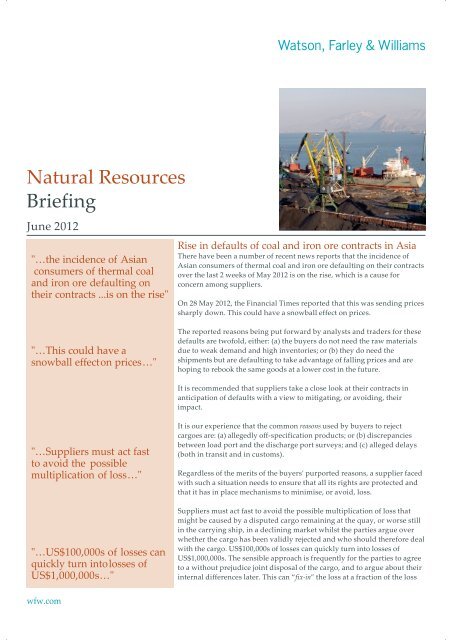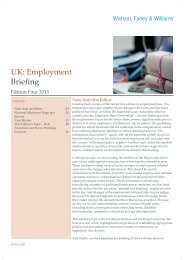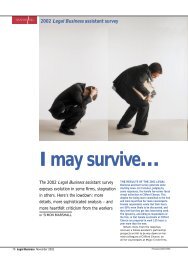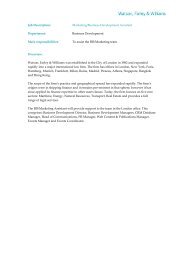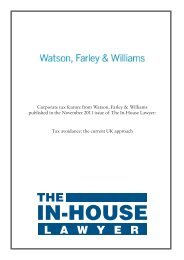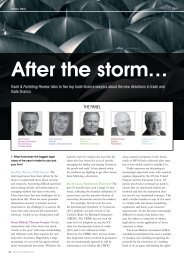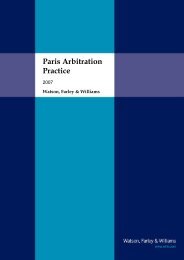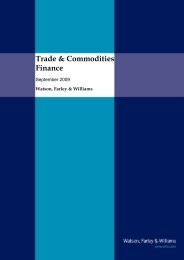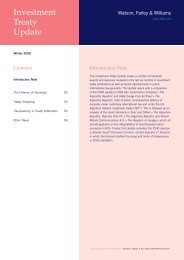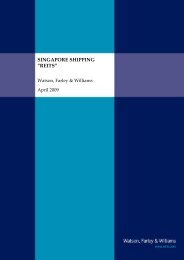Natural Resources Briefing - Watson, Farley & Williams
Natural Resources Briefing - Watson, Farley & Williams
Natural Resources Briefing - Watson, Farley & Williams
Create successful ePaper yourself
Turn your PDF publications into a flip-book with our unique Google optimized e-Paper software.
<strong>Natural</strong> <strong>Resources</strong><strong>Briefing</strong>June 2012ʺ…the incidence of Asianconsumers of thermal coaland iron ore defaulting ontheir contracts ...is on the riseʺRise in defaults of coal and iron ore contracts in AsiaThere have been a number of recent news reports that the incidence ofAsian consumers of thermal coal and iron ore defaulting on their contractsover the last 2 weeks of May 2012 is on the rise, which is a cause forconcern among suppliers.On 28 May 2012, the Financial Times reported that this was sending pricessharply down. This could have a snowball effect on prices.ʺ…This could have asnowball effect on prices…ʺThe reported reasons being put forward by analysts and traders for thesedefaults are twofold, either: (a) the buyers do not need the raw materialsdue to weak demand and high inventories; or (b) they do need theshipments but are defaulting to take advantage of falling prices and arehoping to rebook the same goods at a lower cost in the future.It is recommended that suppliers take a close look at their contracts inanticipation of defaults with a view to mitigating, or avoiding, theirimpact.ʺ…Suppliers must act fastto avoid the possiblemultiplication of loss…ʺʺ…US$100,000s of losses canquickly turn into losses ofUS$1,000,000s…ʺIt is our experience that the common reasons used by buyers to rejectcargoes are: (a) allegedly off‐specification products; or (b) discrepanciesbetween load port and the discharge port surveys; and (c) alleged delays(both in transit and in customs).Regardless of the merits of the buyers’ purported reasons, a supplier facedwith such a situation needs to ensure that all its rights are protected andthat it has in place mechanisms to minimise, or avoid, loss.Suppliers must act fast to avoid the possible multiplication of loss thatmight be caused by a disputed cargo remaining at the quay, or worse stillin the carrying ship, in a declining market whilst the parties argue overwhether the cargo has been validly rejected and who should therefore dealwith the cargo. US$100,000s of losses can quickly turn into losses ofUS$1,000,000s. The sensible approach is frequently for the parties to agreeto a without prejudice joint disposal of the cargo, and to argue about theirinternal differences later. This can “fix‐in” the loss at a fraction of the losswfw.com
02 NATURAL RESOURCES BRIEFINGthat might be sustained in a falling market where the cargo is not on‐sold and helpmitigate demurrage claims, if any.In a situation where the buyer rejects the cargo due to it allegedly being off‐specification,or due to unfavourable customs authority survey results, the supplier should ensure thatthe cargo is re‐sampled and re‐surveyed by an independent umpire as soon as possible(provided this is permitted by the contract, which it usually is). If this survey is notcarried out promptly, the buyer may be able to raise objections as to the reliability of alater survey, or the supplier may lose the right to a survey altogether.Armed with the results of the umpire analysis, the supplier would then be able tonegotiate a settlement with the buyer, or agree a rapid on‐sale to avoid the consequencesof a declining market.Depending on the results of the negotiations with the buyer, the supplier may then haveto consider its options and weigh the risks and benefits of either affirming or terminatingthe contract. However, we would sound a note of caution here. Whilst termination maybe permitted as a strict matter of the law, doing so and suing for damages against acounterparty in an unfavourable jurisdiction is not something that should be entered intolightly.Should you like to discuss any matter relating to the above, please get in touch with amember of our Commodities team (see below), or your regular contact at <strong>Watson</strong>, <strong>Farley</strong>& <strong>Williams</strong>.ContactsJosh ClarkePartnerSingaporejclarke@wfw.com+65 6551 9126Marcus GordonPartnerSingaporemgordon@wfw.com+65 6551 9157Asya JamaludinAssociateSingaporeajamaludin@wfw.com+65 6551 9184Loretta LauPartnerHong Kongllau@wfw.com+852 2168 6712Mark EvansPartnerLondonmevans@wfw.com+44 20 7814 8099Celia GardinerPartnerLondoncgardiner@wfw.com+44 20 7814 8051Andrew HutcheonPartnerLondonahutcheon@wfw.com+44 20 7814 8049Michael KennyPartnerLondonmkenny@wfw.com+44 20 7814 8042Jan MellmannPartnerLondonjmellmann@wfw.com+44 20 7814 8060John KissanePartnerNew Yorkjkissane@wfw.com+1 212 922 2219Eric DiamantisPartnerParisediamantis@wfw.com+33 1 56 88 49 20All references to ‘<strong>Watson</strong>, <strong>Farley</strong> & <strong>Williams</strong>’ and ‘the firm’ in this brochure mean <strong>Watson</strong>, <strong>Farley</strong> & <strong>Williams</strong> LLP and/or its affiliated undertakings. Anyreference to a ‘partner’ means a member of <strong>Watson</strong>, <strong>Farley</strong> & <strong>Williams</strong> LLP, or a member of or partner in an affiliated undertaking of either of them, oran employee or consultant with equivalent standing and qualification.This brochure is produced by <strong>Watson</strong>, <strong>Farley</strong> & <strong>Williams</strong>. It provides a summary of the legal issues, but is not intended to give specific legal advice. Thesituation described may not apply to your circumstances. If you require advice or have questions or comments on its subject, please speak to your usualcontact at <strong>Watson</strong>, <strong>Farley</strong> & <strong>Williams</strong>.This publication constitutes attorney advertising.© <strong>Watson</strong>, <strong>Farley</strong> & <strong>Williams</strong> 2012 100‐000‐1371 SIN KW KW 01/06/2012wfw.com


